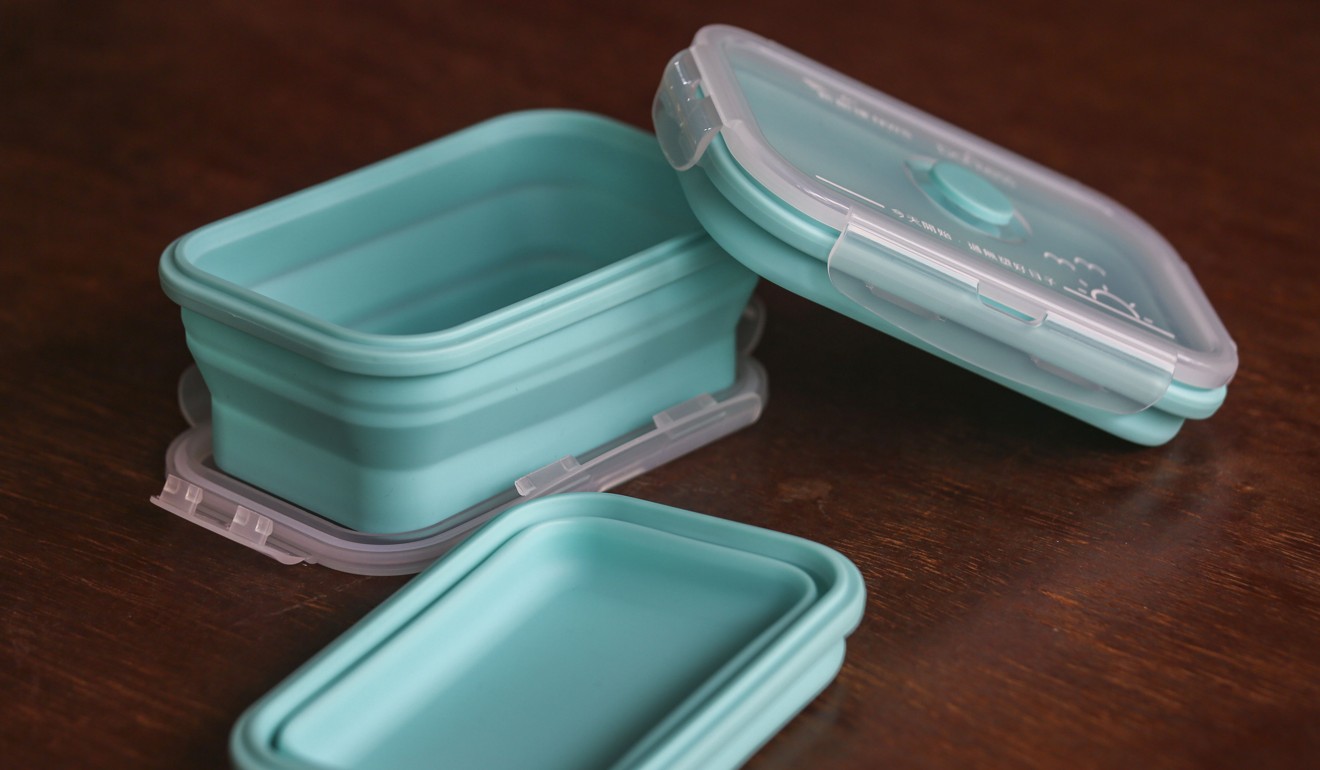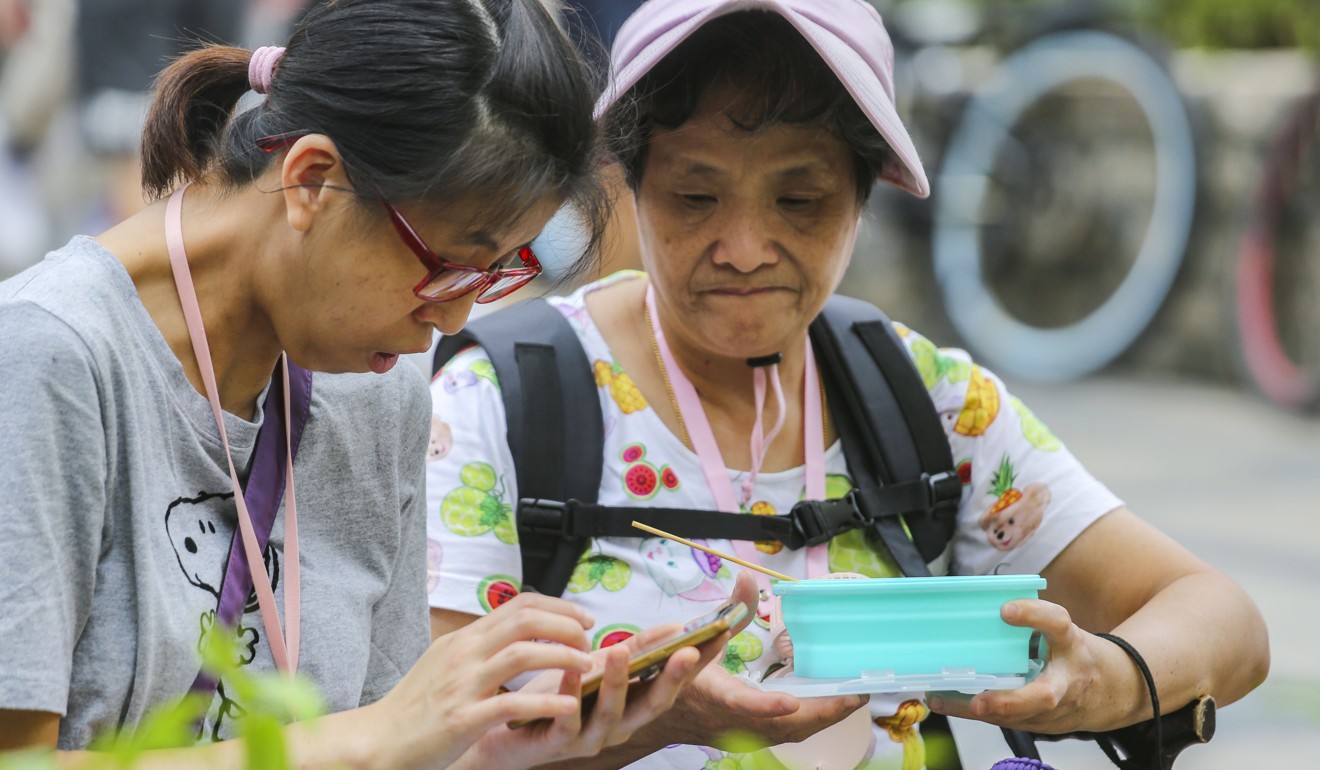
Cheung Chau Island food vendors join campaign providing 4,000 reusable containers to fight Hong Kong’s growing rubbish problem
Mindful of worsening environmental situation, organisers and participants encourage visitors to borrow foldable lunchboxes along with cutlery for a refundable cash deposit of HK$20
Over the past two years, food stall owner Po Sing-wa has seen a number of changes on bustling Cheung Chau Island.
Among them one trend stands out: heaps of plastic forks and food containers that are too eye-catching to ignore, especially after weekends when holiday makers visit the island famous for street snacks such as fishballs.
“They’re everywhere, not only in rubbish bins but also in the baskets of bikes parked along the streets,” the 35-year-old island native says.
Po and his staff sometimes lament the amount of waste produced from all the plastic containers.

“But that’s just among us,” he says. “You have to follow the way people do it here, unless you want to end your business.”
But now, Po’s secret hope of adopting a more environmentally friendly method of serving street food has finally become a reality. A new plastic-free initiative has kicked off on Cheung Chau, providing 4,000 reusable food containers to visitors for free.
From last Saturday, the “Have a Plastic-Free Day” campaign has encouraged visitors on the island to borrow foldable lunchboxes along with chopsticks and forks for a refundable cash deposit of HK$20. In the offer, available every weekend in August, the reusable containers are cleaned and reused.
How Cantonese soups create 40 per cent of Hong Kong’s food waste
A total of 20 local snack bars and restaurants, including Po’s, agreed to join the campaign, offering discounts or extra food to customers with the containers, which are made of silicon.
According to the organisers, some 120 meal boxes were borrowed during the first three hours of the campaign’s first day.
“I feel really touched ... We have received so much support from local shopkeepers and residents,” says co-organiser Francis Ngai Wah-sing, founder of environmental solutions start-up BottLess. “They are so keen to cooperate, even more excited than we are.”

According to 2016 statistics – the most recent available – 67 per cent of what goes into the city’s landfills is municipal solid waste, which is refuse generated from households as well as commercial and industrial sources. Of this, 35 per cent is food waste, while paper makes up 22 per cent, and plastics comprise 21 per cent.
With its acute shortage of land, Hong Kong must fit a big problem into a tiny space. The city’s landfills are set to reach capacity by 2020, according to the Environmental Protection Department.
Ngai says local residents’ strong willingness to participate is directly tied to their personal experience seeing Cheung Chau’s environmental situation worsen.
How Hong Kong’s fast food restaurants serve up a mountain of waste
“As a small but isolated island, it has to process all the waste within the local community, rather than transport it to somewhere else,” he explains.
“Cheung Chau has the perfect environment for us. I hope we can really set an example that shows the effect of cooperation in local communities in a green campaign.”
As one of the most proactive local shop owners, Po finds very few stores and restaurants on Cheung Chau welcoming customers who bring along their own lunchboxes. Island visitors are even less likely to go to the trouble.

“I had some ideas myself about encouraging people to use non-disposable food containers, but I was never motivated to actually do it,” Po admits. His food stall offers campaign participants a one-dollar discount applicable to all snacks.
“This is a first step for me,” he adds. “It’s not too much trouble. I’m just doing something that is not beyond my capacity.”
It’s not too much trouble. I’m just doing something that is not beyond my capacity
Adrian Luk, an island visitor who borrowed a container during the campaign, regards his participation as “a small attempt to adopt a new lifestyle”.
“If no one starts to make a change, then the environment will never change as well,” the 27-year-old researcher says.
“It’s certainly not the discounts that attracted me. I joined it because its intention is good.”
Luk says that although taking part in the campaign does not cost money, it is still “not so convenient” for tourists as they still need to keep their lunchboxes relatively clean to contain different food.
Sheila Tang Cheung-yi, a co-organiser and director of corporate communications and sustainability at NWS Holdings, notes waste reduction is now a widely accepted concept in Hong Kong.
“What we need to do now is provide a solution that takes the convenience and comfort of customers into account,” she says.
Tang hopes Cheung Chau will be the starting point of similar campaigns that could be launched on the food streets of Mong Kok and other parts of the city.
Ngai adds that conditions are ripe to promote a greener lifestyle.
“Now we just need more people to take a first step – however small it is – to make a difference.”

